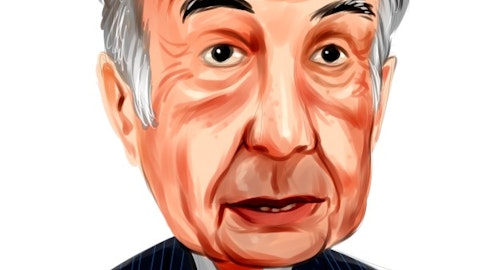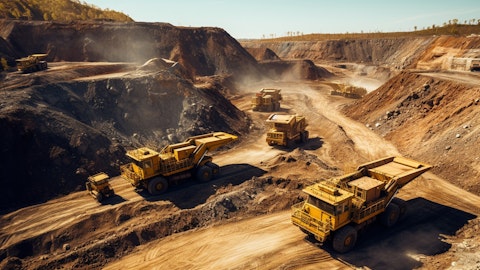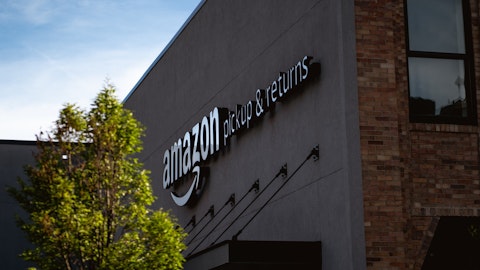And so what we’re really doing now is trying to advance these things so we have optionality, but we’re not wanting to commit to major, major, multi-billion dollar projects in the current environment. We all see this looming deficit coming, but the current price is just don’t support big new investments like this at the current time. We know that will change over time and we want to be prepared at the right time to bring this project on. Permitting takes quite a while and Chile is on trying to streamline permitting. We’re encouraged by that. In terms of the Codelco question on financing, they’re very positive about the project and they’ve indicated to us support for it at the right time and we’ll figure out financing this at the right time when we go forward.
But right now we don’t have to make that decision.
Christopher LaFemina: That is very helpful. Thank you.
Operator: Your next question will come from the line of Michael Dudas with Vertical Research. Please go ahead.
Michael Dudas: Good morning, Richard and Kathleen.
Kathleen Quirk: Good morning, Mike.
Michael Dudas: I’m going to be following up on some of the other questions. I get the sense that access to labor, contracting, rising interest rates, raising the hurdle rates for capital investment, do you think that this has pushed out whatever expectations of maybe Freeport’s longer-term or medium term investments or the industry’s investments given these dynamics, especially the copper price, which as you indicated, I think everybody agrees, wouldn’t support this type of investment?
Kathleen Quirk: Richard, do you want to take that one?
Richard Adkerson: Sure. I think there’s no question about it, Mike. As I said, our revenues and those of other copper producers are correlated to prices. As I talk with a lot of people, and I was just at LME last week, I was with a group of senators and congressmen in Washington the night before last. With the new cost structure, people’s historical views of copper prices need to be adjusted. I mean, at one point, $3.50 or $4.00 copper price was considered to be a very strong price, but with the effects of inflation, it’s not the same. And so you have to look at both of those together. And then the thing that’s really striking to us, and you can see this in a number of other projects by companies around the world, is that capital costs inflation is significant and persistent.
You can see from our own numbers, particularly when diesel costs dropped earlier, they’ve ticked up again some. But I thought we had good performance with our operating cost measures. But then when you get into this issue of major projects, the capital costs are really significant. We really are motivated to invest because we have strong conviction about the future of copper prices, but at the same time, history has taught us that it’s best to be prudent in the way we commit capital. You might could incrementally improve returns if you were more aggressive near term, but we retain all these projects. We don’t lose the opportunity, but we, and I believe others, are going to be prudent until they see how this current situation around the world with China and inflation and central banks activities, and now we’ve got the increasingly complication of geopolitical events going on.
And that’s why I made my comment at the outset that this does nothing but bolster the future supply deficit that the industry is facing. So it’s a two-edged sword. We’d like to go forward, but we’ve concluded it’s best to be prudent. And with the industry, I believe others will as well, and that just means that supplies are going to be limited for the future, the time when copper demand will be growing.
Michael Dudas: It sounds like discretion is the better part of valor. Thank you, Richard.
Richard Adkerson: Thank you.
Operator: Your next question comes from the line of Oris Waukadal [Ph] with Scotia Bank. Please go ahead.
Unidentified Analyst: Hi, good morning.
Kathleen Quirk: Good morning.
Unidentified Analyst: I’m wondering if you can share any expected timeline for reaching any kind of conclusion in Indonesia with respect to the new export royalty rates and potentially the life extension there beyond 41.
Kathleen Quirk: Well, the issue on the duty, you’re talking about the duty, the situation there is that, as you’re aware, our IUPK says that we’re not subject to duties once the smelter gets over 50%. And the government issued some new regulations earlier this year, and this not just applies to Freeport, but all exporters for copper that are required to have smelters that are required to pay a 7.5% duty. And it’s a sliding scale depending on how much progress you’ve made. We have raised the issue with the government, and they are reviewing the issue. They’re also reviewing our progress of the smelter, and we’re going to continue to work cooperatively with them. I want to just remind everyone that there’s alignment of interest to a large degree there because the Indonesian government state-owned company owns 51% of PT-FI, and also PT-FI pays taxes.
So the impact to the government of these export duties is also a significant item. So we’ve got support from our partner there to help us work through this issue with the government, and we’re going to continue to — I don’t have a definitive timeline, but we’re continuing to engage in discussions to address this. The extension discussions are also continuing. Our partner, MIND ID, is also very supportive of extending the operation. One of the really significant benefits that we’ve had in the new structure since 2018 where the government owns 51% is there is a better understanding of the time it takes to develop new resources or extend the resources. And so I think all the parties are aligned in that it makes sense to continue this operation beyond 2041.
We made a lot of progress in developing a framework with the government on what the terms of that extension would be. A big catalyst for us is getting the smelter advanced and completed, and that, I think, would be a good catalyst for us to be able to continue to extend those operations out for the life of this resource. But conversations are ongoing. Indonesia is in an election cycle now, and so there are other things going on in the government. The government has a lot of priorities that they’re balancing. But in terms of the want to and will of getting this extended to be able to continue the benefits that are very significant to the government of Indonesia and the people of Papua, there is good support for doing this. And we’re working very hard to try to get it done as soon as possible, but the timeline is not under our control.
Unidentified Analyst: Thank you for the color.
Operator: Your next question comes from the line of Carlos de Alba with Morgan Stanley. Please go ahead.




